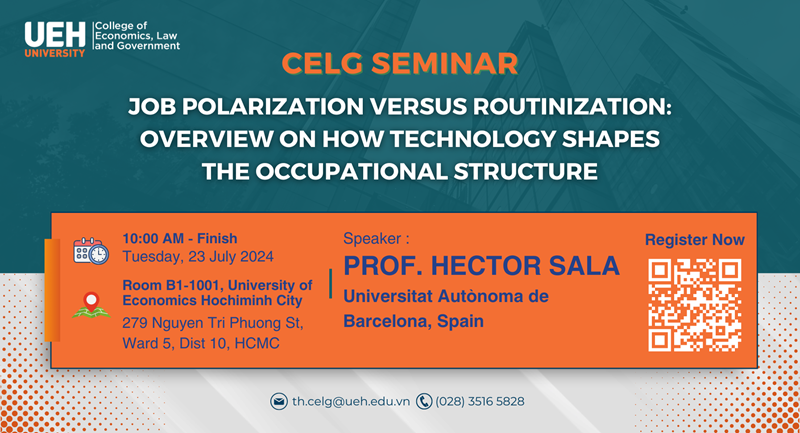Seminar on "Job polarization versus routinization: Overview on how technology shapes the occupational structure"

The College of Economics, Law and Government would like to respectfully invite lecturers/ researchers to come and share your experiences at the CELG seminar:
- Topic: Job polarization versus routinization: Overview on how technology shapes the occupational structure
- Presenter: Prof. Hector Sala, Autonomous University of Barcelona, Spain
- Time: 10:AM, Tuesday, July 23rd, 2024
- Location: B1-1001, UEH Campus B, 279 Nguyen Tri Phuong, District 10
The evolution of the employment structure has generated considerable debate in economic research in recent years. The skill-biased technical change (SBTC) hypothesis which posits that technical change favours high-skilled workers over low-skilled ones, was the most widely used explanation for the observed relative increase in employment at the upper end of the wage distribution of developed countries at the end of the 1990s. However, the SBTC hypothesis cannot account for recent evidence showing what Goos and Manning (2007) termed job polarisation. This phenomenon involves an increase in the share of both low-paid and high-paid jobs at the expense of middle-paid jobs. The most accepted explanation for this has been the routinisation hypothesis proposed by Autor et al. (2003), which suggests that technology can replace workers performing routine tasks, thus reducing labour demand for these workers. While there is still no consensus on the nature and determinants of structural employment change in developed countries, the debate surrounding occupational structural change in developed nations, particularly the impact of automation, has intensified in recent years. This paper provides and overview of this literature and pays specific attention to the transformation of Spain's occupational landscape from 1994 to 2022 across four distinct periods: the pre-crisis growth period (1994-2008), the global financial crisis (2008-2013), the post-crisis recovery (2013-2019), and the COVID-19 pandemic (2019-2022). Evidence on job polarisation emphasizes the need for tailored policies to mitigate the adverse effects on middle-wage occupations. Without such measures, polarisation could exacerbate income inequality, leaving middle-wage workers as the primary casualties of technological progress.
About presenter:
Hector Sala is full professor at the Department of Applied Economics of the Autonomous University of Barcelona (UAB). He received his PhD in Economics from the UAB in 2000 and is a Research Affiliate of Institute of Labor Economics (Bonn, Germany) since 2004. As an applied economist, his key interests lie in the field of macroeconomics, including labor markets, the Phillips Curve, the labor income share, consumption, and fiscal policy issues, in which he has traditionally developed his research. He has been a visiting scholar at the University of Bergamo (2023), the University of New South Wales (2007-2008), and Birkbeck College, University of London (1999). He has also conducted research stays at the University of Saint Andrews (2017), University College Dublin (2016), Ryerson University (2015), University of Kent (2013), Brunel University (2011), Cornell University (2010), Birkbeck College, University of London (2001), and the Institute for the Study of Labor (2000). He has published 50+ international articles in international academic journals and several other studies in Spanish journals and outlets. Information on his research outcome can be found in Scopus (ID 23100847600), ORCID (ID 0000-0002-3043-2790), and Google Scholar. He has led several research projects as principal investigator and supervised 10+ PhD Theses. He is also the cofounder of the Centre for Entrepreneurship and Social Innovation Research (CREIS) at the UAB, under which he has acted as co-editor of the Annual Report on Entrepreneurship, Economy, and Social Innovation. Hector Sala served as Dean of the Faculty of Economics and Business at the UAB for a three-year period (2018-2021).
To receive CELG seminar information, please fill out this form: https://go.ueh.edu.vn/CELG seminar information.
Yours sincerely,
CELG